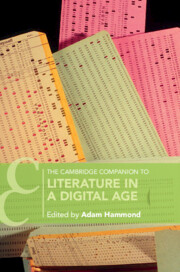Book contents
- The Cambridge Companion to Literature in a Digital Age
- The Cambridge Companion to Literature in a Digital Age
- Copyright page
- Contents
- Figures
- Contributors
- Chronology
- Introduction
- Chapter 1 Literary Data
- Chapter 2 Literary Change
- Chapter 3 The Canon
- Chapter 4 Voice and Performance
- Chapter 5 The Archive
- Chapter 6 Editions
- Chapter 7 Materiality
- Chapter 8 The Literary Marketplace
- Chapter 9 Fanfiction, Digital Platforms, and Social Reading
- Chapter 10 Narrative and Interactivity
- Chapter 11 Generated Literature
- Chapter 12 Literary Gaming
- Chapter 13 The Printed Book in the Digital Age
- Chapter 14 Literature’s Audioptic Platform
- Chapter 15 Critique
- Index
- Cambridge Companions To Literature
Chapter 11 - Generated Literature
Published online by Cambridge University Press: 29 November 2024
- The Cambridge Companion to Literature in a Digital Age
- The Cambridge Companion to Literature in a Digital Age
- Copyright page
- Contents
- Figures
- Contributors
- Chronology
- Introduction
- Chapter 1 Literary Data
- Chapter 2 Literary Change
- Chapter 3 The Canon
- Chapter 4 Voice and Performance
- Chapter 5 The Archive
- Chapter 6 Editions
- Chapter 7 Materiality
- Chapter 8 The Literary Marketplace
- Chapter 9 Fanfiction, Digital Platforms, and Social Reading
- Chapter 10 Narrative and Interactivity
- Chapter 11 Generated Literature
- Chapter 12 Literary Gaming
- Chapter 13 The Printed Book in the Digital Age
- Chapter 14 Literature’s Audioptic Platform
- Chapter 15 Critique
- Index
- Cambridge Companions To Literature
Summary
Computer-generated literary art has been developed for decades across languages and genres, a history we survey. In recent years, it has increasingly been produced by author/programmers: people who fully engage with literary and computational aspects and who sustain a practice in digital literary art rather than undertaking a single experiment. Focusing on those cases where computer systems produce output that is then published, we consider computer-generated literary work in poetry, prose fiction, and minor genres from the 1950s up though the beginning of the 2020s. We argue that such literature uniquely explores machine voices, computer cognition, and other aspects of computing within culture. The text generation systems that are the most hyped at the beginning of 2023 (ChatGPT foremost among them) are proprietary, opaque, and presented as entirely novel, with no historical precedent. In our discussion, we provide several ways to see how an understanding of computing and computer programs gives insight into the rich history of literary text generation and relates to important ongoing work in the area.
Keywords
- Type
- Chapter
- Information
- The Cambridge Companion to Literature in a Digital Age , pp. 194 - 211Publisher: Cambridge University PressPrint publication year: 2024

